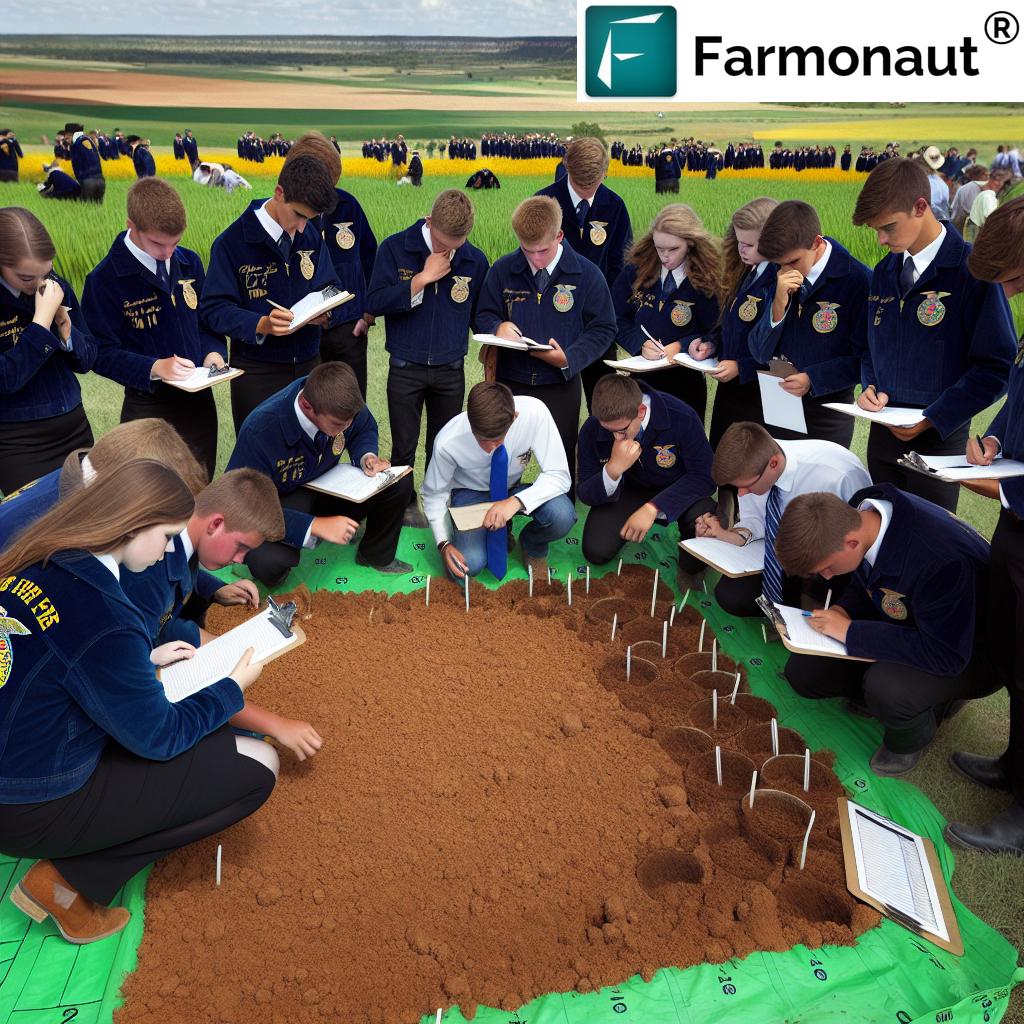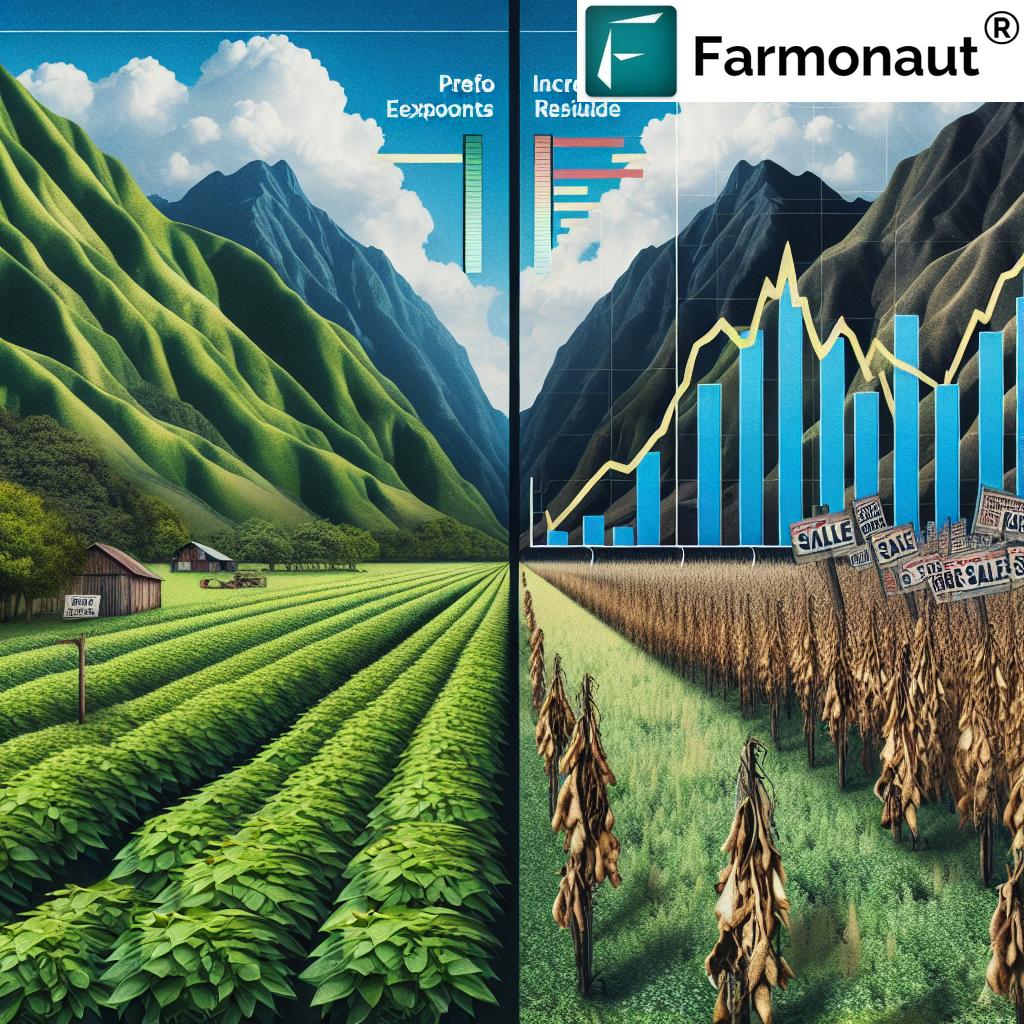Table of Contents
- Introduction: Our Journey to National Land Judging Success
- National Land Judging Competition: Why Oklahoma Sets the Standard
- Trivia: Oklahoma’s National Land Judging Mastery
- 5 Inspiring Oklahoma FFA Stories: Case Studies of Excellence
- Success Story Snapshot Table
- Preparing for Nationals FFA: How We Mastered Land Judging Skills
- Modern Ag Tech: Transforming Field and Soil Judging
- Video Insights: Field Excellence and Smart Land Management
- Ag Technologies Empowering Students and Schools
- Trivia: Spotlighting Top Students in Soil Judging
- Ag Education Career Opportunities Beyond the Event
- Farmonaut’s Precision Agriculture Benefits
- Farmonaut Tools for Land and Soil Management
- Farmonaut Subscriptions for Every School and Farm
- Conclusion: Building Lasting Success in National Land Judging
- FAQ: Land Judging, Ag Education & Farmonaut
National Land Judging Success: 5 Inspiring Oklahoma FFA Stories
The call to explore the land—its depth, texture, and every slope—runs deep in Oklahoma, where FFA land judging thrives. Each year, students from across Oklahoma schools unite their ag skills on the field, ambition in their hearts, and determination on their scorecards as they tackle the national land judging competition in the Oklahoma City area.
For us, this event isn’t just about being top in state competitions or advancing from districts to nationals. It’s about discovering new soil types, learning how to evaluate fields for row crops, managing land for the best treatments, and building lifelong ag education career opportunities. Whether it’s the excitement of spring contests or the hard work of fall practices, our FFA chapters take pride in mastering range and homesite judging, soil depth and erosion assessment, and everything that prepares us for success and future careers.
National Land Judging Competition: Why Oklahoma Sets the Standard
Oklahoma stands as the heartland of the FFA land judging contest. Each spring, the state becomes the destination for passionate teams ready to compete at the highest level. The Oklahoma soil judging event isn’t just an exam; it’s a festival of ag skill, learning, and camaraderie. Here, school teams from many states gather to showcase their expertise in field soil texture analysis, land classification and management, and onsite decision-making.
The goal is to calculate and analyze soil with the precision of seasoned professionals—judging permeability, texture, slope, runoff, and depth. What makes Oklahoma unique is its challenging variety of land classes, pushing every student to recognize the needs of the field and identify the best way to treat and manage it—be it for crops or wildlife. The event also strengthens our ties as FFA chapters across states cheer each other on and share best practices.
“Oklahoma FFA teams ranked in the top 10 nationally for land judging, showcasing impressive field analysis skills.”
5 Inspiring Oklahoma FFA Stories: Case Studies of Excellence
We want to shine a spotlight on the remarkable journeys of Oklahoma’s five standout FFA teams—each representing a unique blend of hard work, school support, and mastery in field analysis and soil judging. Let’s explore what sets these chapters and students apart in the national contest, and how their preparation, teamwork, and vision for the future inspire us all.
Success Story Snapshot Table
| Team/Student Name | FFA Chapter/School | Event Result | Key Skills Demonstrated | Career Aspirations | Estimated Score/Ranking |
|---|---|---|---|---|---|
| Elmwood-Murdock Team | Elmwood-Murdock FFA (First Year) | Nationals Qualified, District Winners, State Runners-up | Soil depth & texture analysis, erosion & slope calculation, management planning | Agronomy, seed sales, ag teaching | Top 5 in Oklahoma |
| Jacob Stewart (Junior) | Elmwood-Murdock FFA | Nationals Team Member | Consistent practice, teamwork, adaptability | Field management, ag education | High individual scorer |
| Hadley Belina (Junior) | Elmwood-Murdock FFA | Nationals Team Member | Attention to detail, field analysis | UNL agronomy, seed sales, teaching | High individual scorer |
| Nolan Platt (Sophomore) | Elmwood-Murdock FFA | Nationals Team Member | Enthusiasm, rapid learning | Ag business, field analysis roles | Strong contributor |
| Leo Rikli (Junior) | Elmwood-Murdock FFA | Nationals Team Member | Cross-state networking, open-minded observation | FFA leadership, ag communication | Top networker |
A Closer Look: What Makes These Teams National Standouts?
-
Elmwood-Murdock: A First-Year Chapter’s Rise
- From districts to the national land judging competition: Elmwood-Murdock FFA started their journey with teamwork and guidance from ag advisor Alan Barnes, winning district contests and becoming state runners-up—advancing to nationals right out of the gate.
- Field practices and hands-on learning: The chapter devoted extra hours to field soil texture analysis, learning how to calculate slope, soil depth and erosion assessment, and proper land classification.
-
Jacob Stewart: Success Driven by Dedication
- As a junior, Jacob believes that consistent, committed practice and refusing to use “first-year” as an excuse led to their success. The team completed every exercise and learned from every event, standing out at the Oklahoma soil judging event.
-
Hadley Belina: Building Careers from Land Judging
- Hadley shares that land judging and FFA contests inspired her career goals, considering studying agronomy at UNL, exploring seed sales, or returning as an ag teacher.
-
Nolan Platt: Embracing Every Ag Opportunity
- Nolan is excited by the newness of Oklahoma soils and eager to test his analytical skills by meeting students from other states during the big nationals spring event.
-
Leo Rikli: Connecting Statewide and Beyond
- Leo values the chance to interact with FFA chapters from other schools and states, expanding his perspective beyond the classroom and learning how to manage land for different uses—whether for best crop yield or wildlife habitat.
These stories remind us of what’s possible with support from schools, former ag teachers, and a class of students who embrace challenges—from measuring soil permeability and runoff to classifying every field. It’s the combined effect of science, practice, and passion that makes the difference at the national land judging competition.
Preparing for Nationals FFA: How We Mastered Land Judging Skills
- Practicing for Perfection: Every fall and spring, we engaged in rigorous land evaluation practices for students, including district events, field visits, and reviewing competition scorecards.
- Learning From Peers and Advisors: We built a network with other FFA chapters and former ag teachers for practical insights into slope determination, soil classification, and field management.
- Targeting Contest Skills: The main focus for the Oklahoma city nationals was not just identifying soil types, but understanding each land’s needs—best management practices for crops, wildlife, and appropriate treatments for erosion and runoff.
- Beyond Textbooks: The field is our greatest classroom. Real-world observation, hands-on practices, and state events build our ability to quickly calculate and assess what each land class requires.
Advancing to nationals means synthesizing everything learned—from a deep understanding of land classes and field texture, to strategic thinking on how to manage and treat diverse Oklahoma soils for long-term ag productivity.
Modern Ag Tech: Transforming Field and Soil Judging
Technology has revolutionized how we approach land and soil judging today. Tools for field soil texture analysis now include data-driven apps, precision mapping, and digital advisory services that provide instant insights into everything from soil depth to runoff calculations.
- Real-time soil data: Weather monitoring, digital soil maps, and on-demand reference guides empower us to make faster, more accurate field decisions at competitions.
- Resource management: Platforms deliver step-by-step recommendations for best field practices, inspired by leading large scale farm management solutions.
- Environmental responsibility: Winning teams are not just judged by their ability to classify and manage land, but also by how they apply carbon footprint tracking tools to enhance field sustainability.
- Transparency and authenticity: In a fast-changing ag landscape, blockchain-based traceability ensures every practice, from plot management to crop sales, can be verified. Explore more on Farmonaut’s product traceability solutions.
By integrating these tools, each FFA chapter can offer students not just competitive mastery, but also firsthand experience with the technology shaping tomorrow’s ag careers.
Video Insights: Field Excellence and Smart Land Management
These videos show how land, soil, and field data can be harnessed for both practical judging events and long-term productivity. Whether it’s revolutionizing land classification and management by using precision ag technology, or understanding soil organic carbon for enhanced sustainability, it’s clear that technology and agronomy go hand in hand for every FFA chapter and school.
Ag Technologies Empowering Students and Schools
- Satellite-Based Crop Health Monitoring: By leveraging multispectral satellite imagery, schools and ag teams access real-time data on vegetation and soil moisture—boosting field performance in both practices and events. Explore the Farmonaut Satellite & Weather API or see our API developer docs.
- Jeevn AI Advisory System: Personalized, AI-driven insights on everything from weather to crop management help optimize land judging and treat every field with maximum efficiency.
- Fleet and Resource Management: Competing in distant districts, state, and nationals events means moving people and equipment efficiently. Check out Farmonaut’s fleet management tools for ag schools and teams.
- Blockchain-Based Traceability: Ensure transparency and integrity in all school ag activities and crop competitions. Discover the benefits for your FFA chapter.
- Crop Loan and Insurance: Planning for the land judging season and beyond? Farmonaut’s crop loan and insurance monitoring tracks conditions and streamlines school and farm financing.
“Over 100 students competed, but only 5 Oklahoma FFA stories stood out for their mastery in soil judging.”
Ag Education Career Opportunities Beyond the Event
Our journey through the national land judging competition is only the beginning! The real value lies in the skills we gain for future ag education careers. From analyzing soil classes and field texture, to learning how to manage land for specific needs, these experiences open doors to a range of ag professions:
- Agronomy: Turn a passion for soil analysis and field management into a career optimizing crop yields, advancing sustainable practices, and driving innovation in land classification.
- Seed Sales & Ag Business: Use expertise in soil depth and treatments to help farmers choose the best solutions for diverse fields, leveraging relationships built through FFA chapters and school competitions.
- Ag Teaching: Inspire the next generation by sharing practical, hands-on knowledge from your own competition and classroom experiences.
- Field Technician: Work with advanced ag tech tools to monitor, calculate, and manage land across states, helping clients treat and maintain their land for optimal productivity.
- Environmental Conservation: Apply land and soil skill sets to roles focused on habitat management, erosion control, and promoting best agricultural practices for wildlife and sustainability.
With the breadth of skills from field analysis to networking, our FFA land judging contest experience positions us for success—whether in local Oklahoma schools, national ag events, or global careers.
Farmonaut’s Precision Agriculture Benefits
For schools, students, or ag professionals aiming to take their field management to the next level, Farmonaut’s suite of data-driven solutions delivers:
- Affordability and Accessibility: Our subscription-based model opens up advanced satellite crop health and land monitoring to everyone—individual students, ag schools, or large enterprises.
- Increased Productivity: Powerful, real-time updates on soil moisture, NDVI, and field performance mean teams make smarter decisions at every step—from practices to competitions.
- Sustainability: With carbon footprint tracking and efficient resource management, students learn to balance productivity with environmental stewardship.
- Transparency: Our blockchain-based systems bring trust to school projects, district and state contests, and even farm-to-market operations—see more at Farmonaut Traceability.
- Scalability: Whether you’re managing a small school plot or vast farmland, our platform scales to fit every need—see large scale management solutions.
Join us in making precision agriculture accessible, sustainable, and fun for students, schools, and ag leaders in every corner of Oklahoma, across the United States, and beyond!
Farmonaut Subscriptions for Every School and Farm
Whether you’re part of an FFA chapter, a teacher leading students through practices, or a professional in the ag industry, Farmonaut offers flexible, scalable subscriptions to ensure you have the right data, support, and technology all year round.
Conclusion: Building Lasting Success in National Land Judging
The national land judging competition in Oklahoma is more than just a contest—it’s a transformative experience for every FFA chapter, student, and school. From mastering soil judging, field analysis, and practical ag skills, to building friendships, exploring career paths, and embracing new technology, it prepares us for a lifetime of success. By combining proven methods with modern tools like Farmonaut, we’re shaping the future of ag education and land management, right here in Oklahoma and beyond.
Our journey proves that with passion, preparation, and the right support, we can conquer any field—literally and figuratively.
FAQ: Land Judging, Ag Education & Farmonaut
What is land and soil judging?
Land and soil judging is the process of evaluating fields by analyzing parameters like soil depth, texture, erosion, slope, permeability, and runoff. Students classify land into different classes and propose management practices—essential skills in both competitions and real agriculture.
Why is Oklahoma known for the national land judging competition?
Oklahoma hosts one of the nation’s premier FFA land judging contests each spring due to its diverse soils, challenging field conditions, and rich FFA culture. This makes it the perfect stage for students to showcase ag skills and field mastery.
How do students prepare for nationals FFA?
Students prepare through a combination of district, state, and national competitions, focused field practices, learning from advisors and former teachers, and hands-on experience with range, homesite, and soil analysis.
What career opportunities are available from land judging?
Land judging cultivates expertise in agronomy, ag business, field analysis roles, environmental conservation, and teaching—paving the way for varied, rewarding careers in agriculture.
How can modern technology help in land and soil judging?
Technology—like Farmonaut’s satellite monitoring, AI advisory, and blockchain traceability—boosts precision, sustainability, and transparency in field and land management, helping both students and professionals make data-driven decisions.
Where can we get Farmonaut’s solutions for our school or farm?
You can start using Farmonaut by registering on the Farmonaut web and mobile app, or check out our specialized tools for API integration, large-scale management, and other use cases.






















